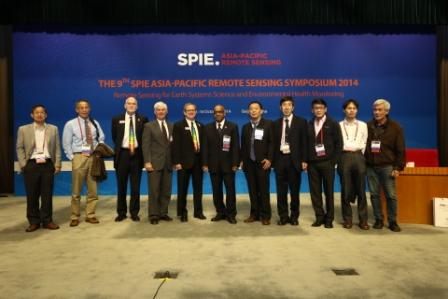
The 9th SPIE Asia-Pacific Remote Sensing Symposium (APRS) opened at Beijing International Conference Center on October 13, 2014, attracting experts and scholars from more than ten countries and regions. Four keynote speakers including Prof. Shi Jiancheng, of the Institute of Remote Sensing and Digital Earth (RADI), CAS, and Dr. Upendra Singh of the NASA Langley Research Center, delivered speeches at the opening ceremony.
Hosted by SPIE and organized by RADI of CAS, the four-day symposium was focused on increasingly severe environmental pollution and its interaction with climate change in the context of world economic and social development. It sought to provide technological support for environmental policy-making, intergovernmental cooperation and regional sustainable development. The seminar covered a wide range of topics such as the atmosphere, clouds, precipitation remote sensing, epi-continental remote sensing, ocean remote sensing monitoring, and laser radar environmental remote sensing. All academic papers accepted by the symposium were recorded in the SPIE database.
Founded in 1955, SPIE is one of the most influential international academic organizations advancing an interdisciplinary approach to the science and application of light. With 235,000 members from 155 countries and regions, the not-for-profit society advances emerging technologies through interdisciplinary information exchange, continuing education, publications, patent precedent, and career and professional growth. SPIE organizes or sponsors 25 international technological forums, exhibitions or education programs in North America, Europe and South Pacific regions each year.
As one of the most important academic conferences on remote sensing, the biennial SPIE APRS is focused on environmental pollution, climate change, sustainable development, ecological protection and special issues for the Asia-Pacific region. The conference has been held in China, the United States, India, Japan, South Korea.
